If you’re building your brand online, why choose WordPress instead of Webflow?
On one side you’ve got Webflow’s glossy, drag-and-drop canvas that lets you see your design come to life in real time.
On the other hand, there’s WordPress, an open-source juggernaut powering millions of “wordPress website” successes around the globe.
Which one deserves your vote?
If you’re at a theme park. Webflow is the shiny new roller coaster that’s thrilling on the first ride. It’s intuitive, it’s smooth, and getting on feels effortless. You’ll have a stunning portfolio or brochure site live before lunch without touching a line of code. That’s the appeal of an “online website builder” built for instant wow.
But now imagine the park’s secret garden tucked behind the main attractions.
“That’s WordPress”
Need to turbocharge your reach with SEO plugins that guide every “create website” step?
It’s right there.
Craving fine-grain control of your design, from header animations to custom fields? It’s all in your toolkit, ready to tweak, extend, and scale.
In the end, you will be able to better understand what platform is suited to your budget and technological resources and growth strategy, so your enterprise blog will operate steadily in the present and be able to transform in the future.
Highlights :
– Why WordPress Wins: Open-source power, endless customization and SEO tools outperform Webflow’s drag-and-drop.
– How Best Fit For:
- Enterprises: Scalable multisite, CRM/ERP integration, VIP support
- Bloggers: Gutenberg blocks, editorial workflows, SEO plugins
- Small Businesses: Quick WooCommerce setup, flexible hosting, lower costs
Feature & Cost Comparison: Charts show WordPress’s pay-as-you-grow hosting vs Webflow’s fixed plans.
Real Success: JNext’s Clone Conservatory and Namaste Village sites, plus TechCrunch, WPBeginner, and Allbirds.
Actionable Tips: Pro and fun tips to supercharge your WordPress site right now.
Which website builder is better? – WordPress or Webflow
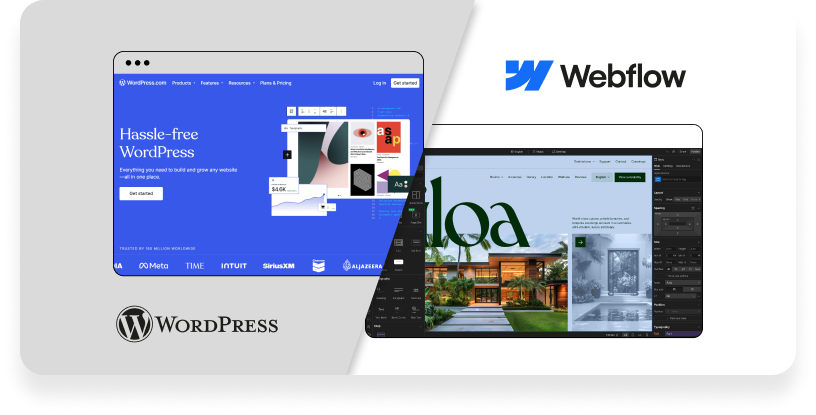
For Enterprises
WordPress grows with you. You are able to roll out a company business site that features multisite networks, user role customization and integrations with a CRM or ERP.
At the enterprise level, hosting and performance tools allow you to support millions of visitors, and super high-performance caching or headless options mean everything stays blazing fast.
When you have high-end support by agencies or WordPress VIP programs, you can have rock-solid reliability plus SLAs that meet mission-critical requirements. None of the other web platforms has such a mature environment of large teams and complicated needs.
For Bloggers
Nothing beats WordPress for creating and managing blog content. The Gutenberg editor and thousands of content-focused themes make drafting, scheduling, and publishing a breeze.
You’ll find plugins to build your editorial calendar, manage authors, or add membership and subscription features. SEO plugins like Yoast or Rank Math guide every “wordpress website” post to rank higher in search results.
Plus your community grows naturally via comments, social sharing, and native RSS feeds. For pure blogging power, WordPress remains the best choice.
For Small Businesses
Bottom Line
Webflow shines for designers who want code-free, visually driven launches. For enterprises, bloggers, and businesses that demand growth, customization, SEO strength, and cost efficiency, WordPress outperforms every time.
Choose the platform that grows with your ambitions. “Choose WordPress”.
Why Migrate from Webflow to WordPress?
Maybe you started your business site on Webflow because its visual design studio made page building feel effortless.
Access over 59,000 plugins for ecommerce, analytics or multilingual content so you can tailor every feature. That flexibility speeds up rollouts, avoids workarounds and boosts your return on investment.
Plus, the global WordPress community acts like an open workshop. You will find tutorials, forums and meetups to help you and your marketing team publish and optimize content without always calling a developer.
By migrating from Webflow to WordPress you get:
- Full ownership of your content and data – no vendor lock-in.
- Scalable performance with managed hosting options and powerful caching.
- Endless customization through themes and plugins that grow with your needs.
- Community support that helps you solve problems in minutes, not days.
If you want to future-proof your online presence, supercharge your SEO and unlock true flexibility, moving to WordPress could be the smartest decision you make this year.
WordPress vs Webflow: An In-Depth Key Features Comparison!
| Feature | WordPress | Webflow |
|---|---|---|
| Platform Type | Open-source CMS you host anywhere | Fully hosted visual builder |
| Customization & Extensibility | Thousands of themes and plugins plus full code access for custom functionality | Visual Designer with custom CSS/JS, but limited integrations |
| Content Editing | Gutenberg block editor with reusable blocks and template parts | Designer UI that merges design and content editing |
| E-commerce | WooCommerce plugin offers enterprise-grade store features | Built-in e-commerce, but fewer payment and shipping integrations |
| SEO & Marketing | Rich plugin ecosystem (Yoast, Rank Math) for on-page SEO, sitemaps, schema, and redirects | Native SEO settings, automatic sitemaps, plus custom code snippets |
| Performance & Hosting | Choose your own host (shared, managed, serverless); wide cache/CDN options | Hosting included; automatic global CDN, but no self-hosted alternatives |
| Cost Structure | Hosting + premium themes/plugins; potentially lower TCO at scale | Subscription-based plans that include hosting |
| Learning Curve | Moderate: initial setup, plugin management, occasional PHP/CSS tweaks | Low for basic sites; steeper if you dive into advanced interactions |
| Security & Maintenance | Manual or managed updates; extensive security plugins; backups and staging with third-party tools | Automatic platform updates; SSL included; fewer third-party security options |
| Community & Support | Huge global community, forums, meetups, agencies, and third-party tutorials | Official Webflow University, community forum, and paid support |
| Scalability & Flexibility | Scales from simple blogs to enterprise portals; unlimited custom post types and API integrations | Best for small to mid-size sites; advanced features require paid plan upgrades |
| Ideal For | Bloggers, enterprises, and businesses needing full control, deep customization, and SEO power | Designers and small businesses wanting quick, code-free launches with built-in hosting |
Webflow Pricing vs WordPress Hosting: Cost Comparison
| Plan | Webflow Pricing | WordPress Hosting |
|---|---|---|
| Starter | Basic Site: $18/mo | Shared Hosting: $3–$5/mo |
| Content | CMS Plan: $29/mo | Managed Hosting (Small Business): $20–$30/mo |
| Business | Business Plan: $49/mo | VPS or Cloud Hosting: $40–$60/mo |
| E-commerce | – Standard: $29/mo – Plus: $74/mo | WooCommerce on Managed Hosting: $25–$50/mo |
| Enterprise | Custom Enterprise Solutions (contact for pricing) | VIP or Dedicated Servers: $100+/mo |
Market Comparison of the usage statistics of WordPress vs. Webflow for websites

According to the latest usage statistics published by W3Techs, June 2025, WordPress remains the dominant CMS, powering over 61% of websites globally. Its strong presence continues across the top 1 million to the top 1,000 websites.
In contrast, Webflow holds between 1.2% and 3.4%, reflecting growing popularity in niche and design-driven markets but still a much smaller share compared to WordPress’s widespread adoption.
WordPress CMS vs Webflow CMS: Which Powers Your Content Best?
Choosing a CMS is like picking the engine for your digital vehicle. Both WordPress CMS and Webflow CMS let you manage content without rebuilding pages from scratch, but they fuel your site in very different ways.
WordPress CMS
- Infinite Flexibility: With thousands of themes and plugins, you can tailor your “wordpress website” to any need, whether you run a simple blog or a full membership portal.
- Robust Content Tools: The Gutenberg editor transforms content blocks into reusable modules, making “creating website” magic a breeze. Need an editorial calendar or custom post types? There’s a plugin ready.
- SEO Powerhouse: Plugins like Yoast or Rank Math guide every post to peak performance so your site climbs search rankings without extra effort.
- Open-Source Freedom: You choose your host, database and server setup and tweak every line of code. No limits mean your “online website builder” evolves with your vision.
Webflow CMS
- Visual Content Management: The Designer interface lets you place dynamic content anywhere on your page with no code required. It’s perfect for designers who want pixel-perfect control.
- Structured Collections: Content is stored in collections such as blogs, portfolios or products that you can style globally. It’s intuitive but can feel restrictive when you need a custom layout.
- Built-In Hosting and Security: Your CMS and hosting live together on Webflow’s servers so updates and backups happen automatically. You trade some control for a worry-free setup.
- Limited Extensibility: While you can embed custom code, there is no plugin ecosystem. If you need advanced SEO features or complex integrations, you may find yourself constrained.
The Verdict
If you want a truly limitless “website platform” that grows with your ambitions, supported by a global community and a vast library of tools, WordPress CMS is the clear winner.
For quick, design-driven projects with built-in hosting, Webflow CMS is a strong choice. When it’s time to scale, optimize and customize every detail of your wordpress website builder, WordPress takes the checkered flag.
Gutenberg Editor vs Webflow Designer: Why WordPress Dominates Content Creation
When it comes to crafting your next wordpress website, the editor you choose makes all the difference. Here’s why the Gutenberg editor in WordPress leaves the Webflow Designer in the dust:
Gutenberg Editor
- Block-Based Freedom
Every paragraph image or button is its own block you can move style and save as a reusable pattern. You build complex layouts in minutes without writing code. - Instant Plugin Synergy
Need a custom gallery newsletter signup or FAQ section? Just install a block plugin and drop it into place. Your online website builder evolves feature by feature with no limits. - High Performance
Gutenberg renders content on the server side so your pages load lightning fast. Combine it with caching and optimization plugins for rock solid speed under any traffic surge. - Ever-Expanding Ecosystem
With thousands of Gutenberg native blocks available you’ll never run out of ways to make your site stand out.
- Visual Styling Only
You adjust margins, typography and interactions live but you must handle layout complexity yourself. - No Plugin Marketplace
Custom code snippets are your only option for extra features. There is no built in library of extensions to boost your created website experience. - Client-Side Rendering
You see your design in the browser but you may face slower load times on larger sites and manual performance tuning. - Learning Curve for Advanced Layouts
Flexbox and grid controls are powerful but mastering them takes time and practice.
If you want effortless content creation, deep customization and built-in SEO power the Gutenberg editor in WordPress is the clear choice. It turns your CMS into a creative playground that scales from simple blogs to enterprise portals. When it’s time to launch quickly and grow without limits WordPress reigns supreme.
Real-World Success Stories: How Blogs & Businesses Thrive on WordPress
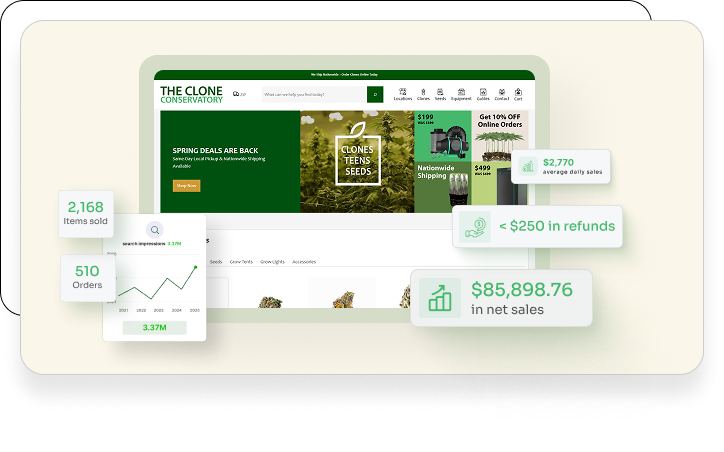
JNext Services’ Success Stories:
Clone Conservatory
- $85,898.76 in net sales
- 510 orders, 2,168 items sold
- $2,770 average daily sales
- Less than $250 in refunds
- 3.37M search impressions
- 110K clicks with a 3.3% CTR
Within three months, proof that a well-built online website builder hub can turn casual readers into loyal subscribers.

Namaste Village Restaurant, London
For Namaste Village, an upscale Indian restaurant in London, JNext Services crafted a sleek business site on WordPress that married stunning visuals with seamless functionality. We implemented:
- An interactive menu with allergy filters
- Real-time table reservations via a booking plugin
- Geo-targeted SEO optimizations (keywords like “best website creator” and “design studio”)
- Integration with social feeds for daily specials
Within two months, Namaste Village saw a 35% rise in online reservations and climbed to page one for “London restaurant website design.”
Other Real-World Wins
- TechCrunch is capable of reaching millions of readers a day with blistering load times and alarm-clock uptime and shows the strength of enterprise-scale scaling.
- WPBeginner was once a small tutorial blog and now has more than 400,000 monthly subscribers, thanks to the addition of membership levels and premium courses on WordPress.
- Allbirds uses WooCommerce on WordPress to strike down its e-commerce empire and support by pressing the button of the rapid launch and A/B testing to provide constant sales growth.
WordPress has had its successes in personal niche blogging, high-volume media companies, and even restaurants and has shown time and again that as the greatest site-building kit in the universe, it can scale, shift and provide realistic ROI.
Decision Time: Is WordPress the Right Choice Over Webflow for You?
You’ve seen Webflow’s flash: beautiful pages in minutes with no code required.
But if you’re serious about long-term growth, deep customization and SEO that drives real traffic, “WordPress is the clear winner”.
If you’re ready to move beyond Webflow’s limitations and take full control of your website with WordPress, now’s the time to make the switch.
Kick off your WordPress journey today.
Explore our free demo or schedule a no obligation consultation with the JNext Services team.
Let us build something amazing together with WordPress.


 June 30, 2025
June 30, 2025
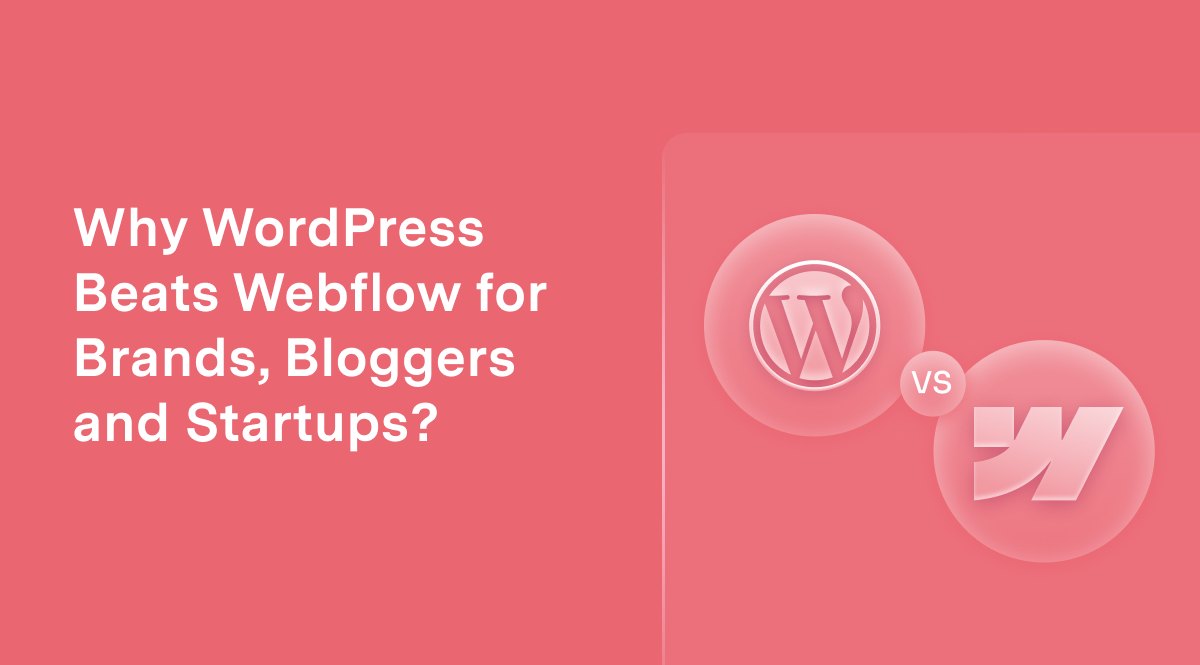
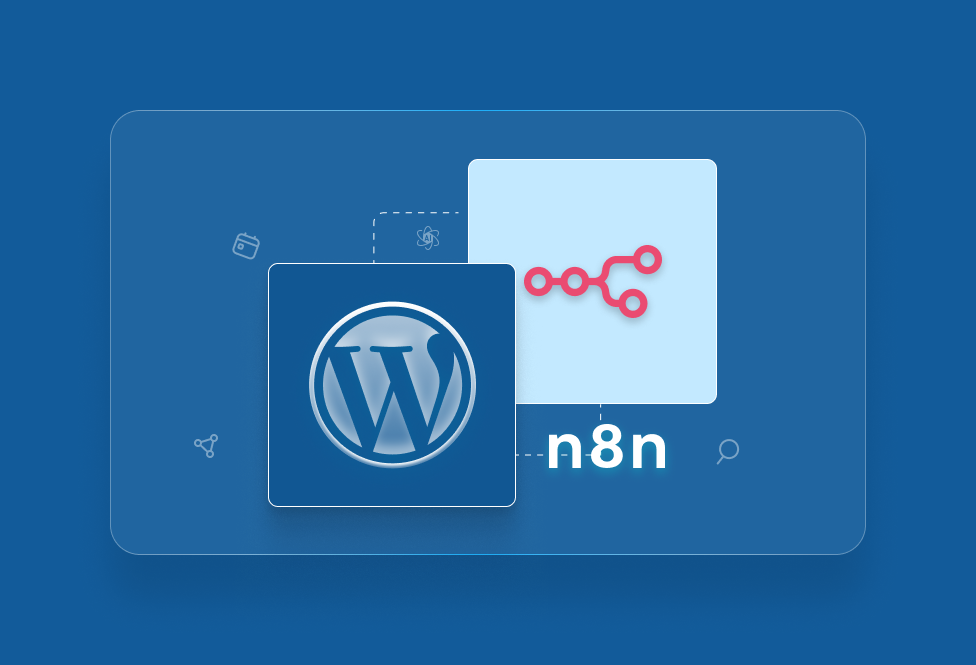

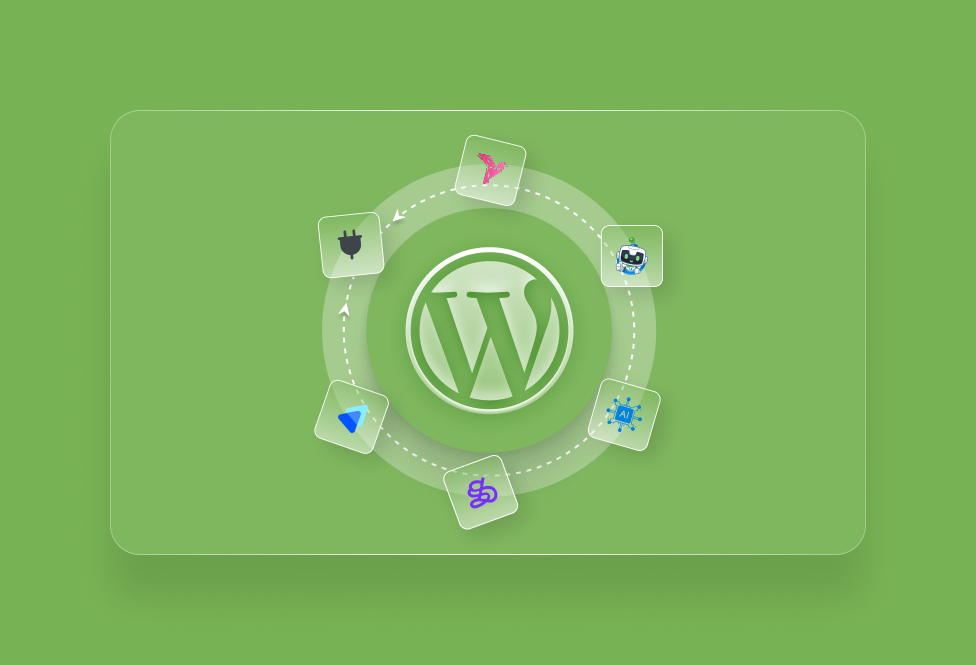
TEAM id
jnext_services
email us [email protected]
india
+91 98587 63596
United Kingdom
+ 44 77679 57915